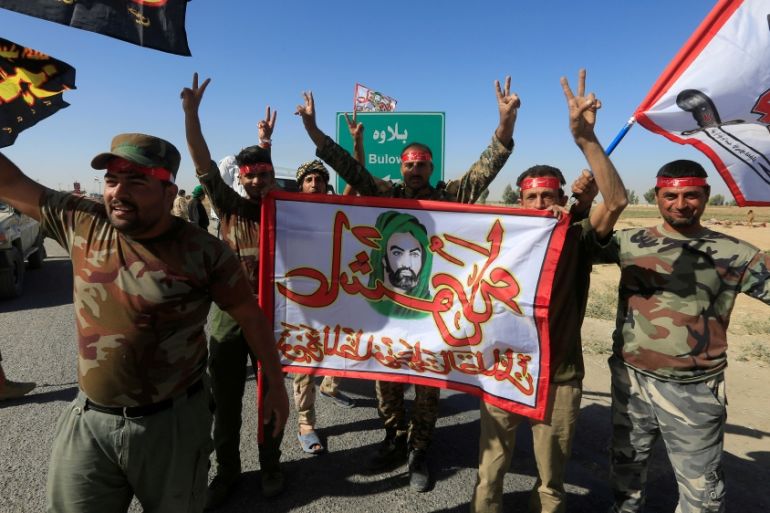Why the US can’t afford to lose Iraqi Kurdistan
Iraq’s future stability and US regional interests depend on Iraqi Kurdistan.

US relations with the Kurdistan Region of Iraq took a major blow in recent weeks. In the aftermath of the Kurdish referendum for independence, Iraq’s security forces, alongside the Shia militias of the Popular Mobilisation Units (PMUs) launched an offensive against the Peshmerga in the disputed territory of Kirkuk, with US acquiescence.
On Tuesday, these forces went as far as launching an offensive on Fish-Khabur area on the Iraq-Turkey border, where Iraqi Kurdistan’s most important oil hub is located. Peshmerga forces managed to repel the attack. On Thursday there were further clashes after Baghdad deployed additional forces to the area.
Keep reading
list of 4 itemsTurkey hits 71 targets in Iraq, Syria in retaliation for soldiers’ deaths
Turkey says bombers came from Syria, threatens more cross-border strikes
‘Iraqis love life’: In conversation with Ala Talabani
Highly dependent on oil for both economic and political stability, the Iraqi government naturally went after Kirkuk, a strategically vital province with estimated 9 billion barrels of oil reserves, which has been under Erbil’s control since 2015. But its push to capture Fish-Khabur risks escalating the conflict into a civil war – something the US cannot afford to allow.
US officials had previously warned the KRG against holding the referendum but failed to convince the Kurdish leadership that they could broker a compromise between the KRG and Baghdad over long-standing disputes. They warned that the referendum would carry risks that the US could not control.
Kurdistan’s leadership has expressed disappointment at what it perceives as US indifference and negligence, as the White House asserted that it was not going to take sides. For the general Kurdish public, Washington’s acquiescence was a betrayal.
Despite Washington’s decision to back Baghdad, it still needs the KRG as an ally in Iraq and the region. Without its help, it risks losing its positions in Iraq and allowing Iran to strengthen its grip on the country.
The precarious US policy in Iraq
Washington’s decision to back Baghdad in its dispute with Erbil was based on its strategy to help Iraqi Prime Minister Haidar al-Abadi consolidate power and curb Iranian influence.
But by acquiescing to Baghdad’s offensive on Kirkuk, the US inadvertently empowered the Iran-backed militias, which have dominated Iraq’s security sphere since the 2014 collapse of the Iraqi armed forces.
The PMUs are supported by large segments of the Shia community in Iraq and will almost certainly alter the political map of the country in forthcoming elections in 2018. While in their ranks there are a number of state-aligned units that do not answer to Tehran, the PMUs are led and dominated by two Tehran-linked militias: the Badr Brigade and Ketaib Hezbollah.
The former was established by the Iranian Revolutionary Guards Corps (IRGC) in the 1980s, and the latter has been designated a “terrorist” organisation by the US. Within the PMUs, there’s also Asaib Ahl al-Haq, which was established and armed by Iran and which has launched countless attacks on US military personnel since 2006.
The US does not have many choices for partners in Iraq: factions within the political elite willing to work with Washington are either too weak or too insignificant. The strongest parties and factions tend to be aligned with Iran. The only strong anti-Iran faction is led by the anti-US cleric Muqtada al-Sadr. He leads the powerful Sadrist movement that has traditionally adopted a strong Iraqi nationalist discourse, but the movement is too malevolent for US purposes and is responsible for countless atrocities and attacks on American citizens.
Washington has stuck to al-Abadi, who lacks a sufficiently strong popular and political base, with the hope that Iraq’s military gains against ISIL will remedy his shortcomings. But this strategy is fraught with challenges and could unravel even before the elections if his rivals continue to challenge his premiership and build on their own ascendancy.
Al-Abadi on his own cannot stand up to Iran, which is where the KRG comes in. If Washington is serious about wanting stability in Iraq, it has to repair its relations with the Kurds. To do that, it has to ensure the KRG has a stake in the Iraqi state and participates in the Baghdad government, despite recent events. Since 2003, no government has been formed without Kurdish participation.
Baghdad has suffered a credibility and legitimacy deficit because of Arab Sunni disenfranchisement and marginalisation at the hands of the ruling Shia political class. It cannot afford to also lose the Kurds, who have generally enjoyed the role of kingmaker as a consequence of the diffuse nature of power and politics in Iraq and the resulting confessional power-sharing arrangements.
If there is no Kurdish engagement to bolster al-Abadi’s position, hardline Iran-aligned factions will almost certainly dominate the government and consolidate their hold on state institutions. To make such an arrangement work both in the short and long-term, equitable, just and sustained power-sharing arrangements must be firmly installed within Iraq’s political system.
As it has done historically, the KRG provides the US with strategic depth in a country that is becoming increasingly dominated by actors hostile to its engagements and values. Abadi may not even be in office this time next year. The Kurds can bolster US influence in Iraq but only if Washington prevents continued advances from Baghdad aimed at putting the KRG under economic siege. If this happens, the situation could escalate into another civil war.
The views expressed in this article are the author’s own and do not necessarily reflect Al Jazeera’s editorial policy.
